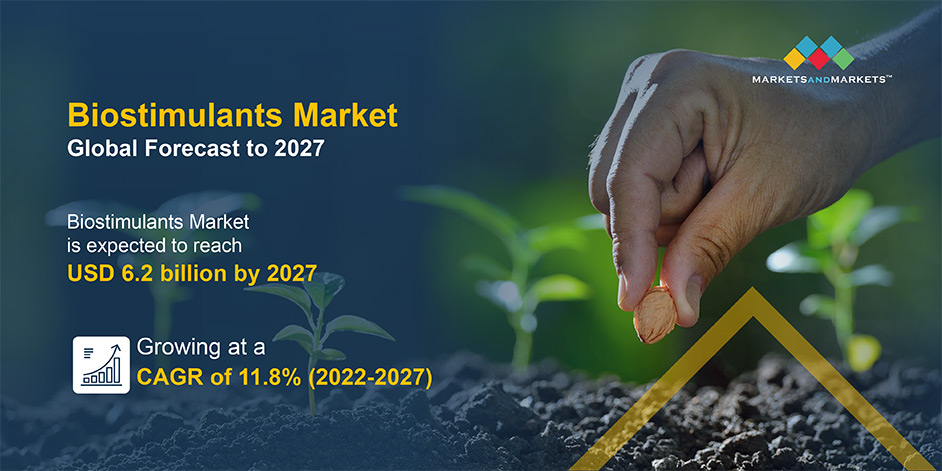The globalbiostimulants marketwas valued at USD 3.5 billion in 2022 and is projected to reach USD 6.2 billion by 2027, growing at a cagr 11.8%from 2022 to 2027. Food and agricultural production systems worldwide are facing unprecedented challenges, from the increasing demand for food for a growing population, rising hunger and malnutrition, adverse climate change effects, overexploitation of natural resources, loss of biodiversity, and food loss and waste. These challenges can undermine the worlds capacity to meet its food needs now and in the future.

Download PDF Brochure:
https://www.marketsandmarkets.com/pdfdownloadNew.asp?id=1081
Drivers: Increase in need for sustainable agriculture
A high level of hunger and malnutrition is one of the major challenges that the world is facing today. To meet the increasing demand for food from over 9 billion people by 2050, immense pressure on agriculture will be exerted to produce crops with a high-quality yield. Simultaneously, one-third of the total food production is wasted globally throughout the supply chain, incurring enormous environmental and financial costs.
Agricultural producers are required to identify possible ways to be more efficient and effective in the coming decade. Biostimulants can sustainably address this issue by providing protection against stress, thereby stimulating the plants growth. The market for biostimulants is expected to grow in the coming years due to the increasing consumer awareness about the benefits of organic foods, the implementation of organic regulations, and the adoption of GLOBALGAP (Global Good Agricultural Practices) policies. A large variety of crops, such as fruits vegetables and cereals, have been gaining support for organic practices from government subsidies and financial aids as well as research assistance from organizations and regulatory bodies, such as FiBL (Research Institute of Organic Agriculture, Switzerland), and USDA (US).
Opportunities: Growing demands for seed treatment
According to MarketsandMarkets insights, there is a growing demand for biostimulant treated seeds globally. The production of high-quality and effective seeds is essential for obtaining a higher crop yield. Biostimulants facilitate an increase of seed vigor during the crucial growth phases, due to which they are being used globally for seed treatment purposes. In addition, many companies have already started exploring this segment with increased investments in RD activities. The right combination of synthetic crop protection and biological-based seed treatments is proving to be useful. Cotton seedlings were the first to be treated on a large scale with biological solutions in the US in 1999; the industry has grown since. Seed treatment provides an efficient mechanism for enhancing the activity of seeds in the soil environment, where they are appropriately positioned to colonize seedlings and roots and protect them against soil-borne diseases and pests.
Request Sample Pages:
https://www.marketsandmarkets.com/requestsampleNew.asp?id=1081
Europe dominated the biostimulants industry and is projected to grow at a CAGR of 11.5% during the forecast period
Europe accounted for the largest share in the biostimulants market in 2021. An increase in land degradation, the need for quality parameters, and the need for high product yield have strengthened the European regulatory authorities demand for clean and sustainable input solutions. The concept of organic production has also gained popularity among farmers and consumers in the last decade. The need for organic products, such as biostimulants, has seen a rising trend in the EU. This has boosted various European biostimulant companies expanding their global network to reach the untapped market. The region has also launched the European Green Deal initiative, which aims to expand the use of sustainable practices, such as precision agriculture, organic farming, agroecology, agroforestry, and stricter animal welfare standards. The new Farm to Fork Strategy aims at reducing the environmental and climate footprint of the EU food system, strengthening its resilience, ensuring food security, facilitating the transition toward competitive sustainability from farm to fork, and making use of new business opportunities.
The key players in this market include BASF SE (Germany), UPL Limited (India), Adama Ltd. (Israel) and FMC Corporation (US).





















